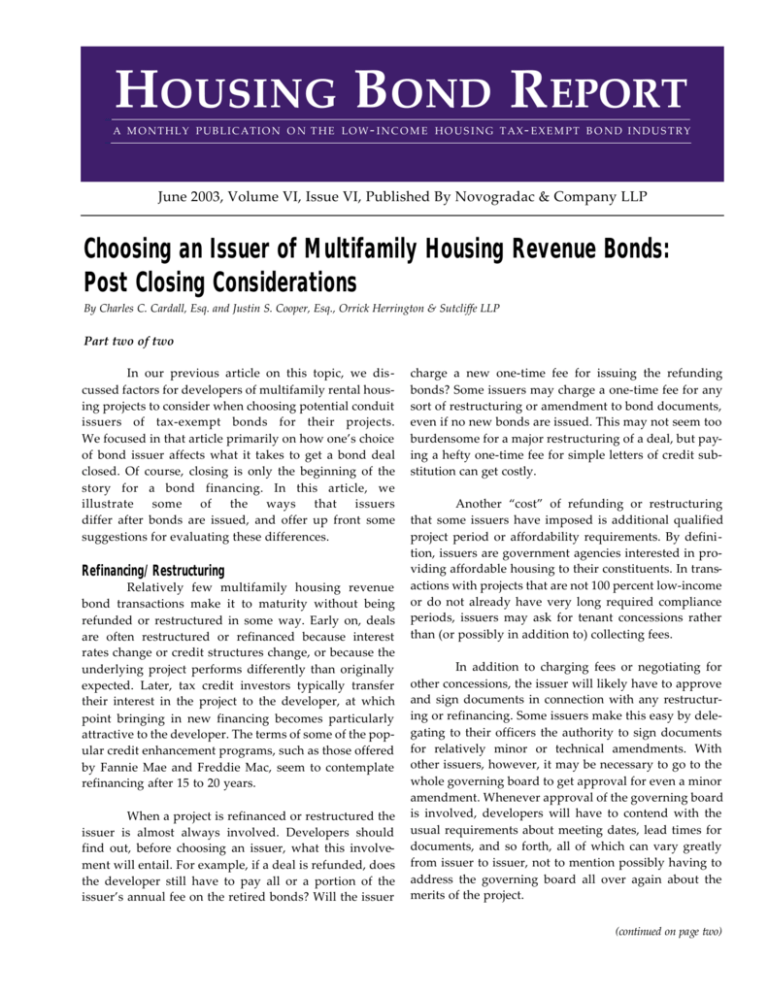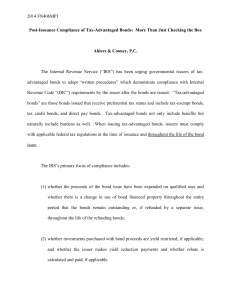
HOUSING BOND REPORT
A M O N T H L Y P U B L I C A T I O N O N T H E LOW - I N C O M E H O U S I N G T A X - E X E M P T B O N D I N D U S T R Y
June 2003, Volume VI, Issue VI, Published By Novogradac & Company LLP
Choosing an Issuer of Multifamily Housing Revenue Bonds:
Post Closing Considerations
By Charles C. Cardall, Esq. and Justin S. Cooper, Esq., Orrick Herrington & Sutcliffe LLP
Part two of two
In our previous article on this topic, we discussed factors for developers of multifamily rental housing projects to consider when choosing potential conduit
issuers of tax-exempt bonds for their projects.
We focused in that article primarily on how one’s choice
of bond issuer affects what it takes to get a bond deal
closed. Of course, closing is only the beginning of the
story for a bond financing. In this article, we
illustrate
some
of
the
ways
that
issuers
differ after bonds are issued, and offer up front some
suggestions for evaluating these differences.
Refinancing/Restructuring
Relatively few multifamily housing revenue
bond transactions make it to maturity without being
refunded or restructured in some way. Early on, deals
are often restructured or refinanced because interest
rates change or credit structures change, or because the
underlying project performs differently than originally
expected. Later, tax credit investors typically transfer
their interest in the project to the developer, at which
point bringing in new financing becomes particularly
attractive to the developer. The terms of some of the popular credit enhancement programs, such as those offered
by Fannie Mae and Freddie Mac, seem to contemplate
refinancing after 15 to 20 years.
When a project is refinanced or restructured the
issuer is almost always involved. Developers should
find out, before choosing an issuer, what this involvement will entail. For example, if a deal is refunded, does
the developer still have to pay all or a portion of the
issuer’s annual fee on the retired bonds? Will the issuer
charge a new one-time fee for issuing the refunding
bonds? Some issuers may charge a one-time fee for any
sort of restructuring or amendment to bond documents,
even if no new bonds are issued. This may not seem too
burdensome for a major restructuring of a deal, but paying a hefty one-time fee for simple letters of credit substitution can get costly.
Another “cost” of refunding or restructuring
that some issuers have imposed is additional qualified
project period or affordability requirements. By definition, issuers are government agencies interested in providing affordable housing to their constituents. In transactions with projects that are not 100 percent low-income
or do not already have very long required compliance
periods, issuers may ask for tenant concessions rather
than (or possibly in addition to) collecting fees.
In addition to charging fees or negotiating for
other concessions, the issuer will likely have to approve
and sign documents in connection with any restructuring or refinancing. Some issuers make this easy by delegating to their officers the authority to sign documents
for relatively minor or technical amendments. With
other issuers, however, it may be necessary to go to the
whole governing board to get approval for even a minor
amendment. Whenever approval of the governing board
is involved, developers will have to contend with the
usual requirements about meeting dates, lead times for
documents, and so forth, all of which can vary greatly
from issuer to issuer, not to mention possibly having to
address the governing board all over again about the
merits of the project.
(continued on page two)
Choosing an Issuer
HOUSING BOND REPORT
EDITORIAL BOARD
(continued from page one)
Evaluating or possibly limiting these risks is difficult to do with
any real level of certainty. Many issuers have established policies and practices that they can easily describe to prospective conduit borrowers, and
these policies and practices tend to change very slowly. Policies and practices, however, can and do change, and current issuer officials typically will
not be willing to bind, or will not legally be able to bind, future officials to
adhere to current policies and practices. The only real advice we can give is
that more active and established issuers will act in a more predictable fashion and that a healthy discussion of these issues before closing is likely to
result in less change in an issuer’s policies and practices in the future.
Issuers as Project Administrators
Issuers of tax-exempt bonds used to finance multifamily rental
housing projects will always be interested in ensuring that the projects they
finance comply on an ongoing basis with the minimum legal requirements
of state law and the tax code. Typically, issuers also have some interest, for
policy reasons or otherwise, in ensuring that the projects comply with various, and much more vague, habitability, public safety and neighborhood
compatibility standards. No issuers want the projects they finance to be out
of legal compliance, to be in financial trouble or to otherwise be a problem
for their constituents. The real question is what steps will an issuer take to
make sure these desires are satisfied.
In many cases, the issuer signs a Regulatory or Land Use
Agreement that imposes certain monitoring responsibilities on it for the
life of the bonds. Even if the regulatory agreement does not contain any
such administrative responsibilities, state law may impose monitoring
duties on the issuer. The tax code is silent as to an issuer’s monitoring
responsibilities in its capacity as issuer of tax-exempt bonds, but where tax
credits are involved, it may be a different matter (see below). In addition to
these legal and policy reasons for monitoring project compliance, an issuer
(such as a city, county or state housing agency) that puts money into the
project, whether as primary lender or as a subordinate lender, is likely to
undertake a certain degree of monitoring if only to protect the value of its
security interest.
How much and the type of monitoring issuers undertake varies
greatly. There are issuers that do almost nothing, while others make site visits at least annually and require frequent status reports, formal or informal.
Of the more engaged issuers, some undertake monitoring themselves,
while others hire professional staff to do the work on their behalf.
Developers may want to consider whether they prefer working directly
with a governmental entity or with hired staff who are independent contractors.
Publisher
Michael J. Novogradac,
CPA
Editor
Jane Bowar Zastrow
Assignment Editor/Staff
Writer
Alex Ruiz
Technical Editor
Robert S. Thesman, CPA
Production
Alexandra Louie
H OUSING BOND REPORT
I NFORMATION
Address all correspondence and editorial submissions to:
Jane Bowar Zastrow
Housing Bond Report
Novogradac & Company
LLP
246 First Street, 5th Floor
San Francisco, CA 94105
Telephone: 415.356.8034
E-mail: cpas@novoco.com
Visit us on the web:
www.taxcredithousing. com
Editorial material in this
publication is for informational purposes only and
should not be construed
otherwise. Advice and
interpretation regarding
tax-exempt bonds or any
other material covered in
this publication can only
be obtained from your tax
advisor.
No portion of this material
may be reprinted without
written permission of
Novogradac & Company
LLP.
© Novogradac & Company
LLP, 2003
All rights reserved.
(continued on page three)
2
June 2003
www.taxcredithousing.com
Novogradac & Company LLP
HOUSING BOND REPORT
HOUSING BOND REPORT
A DVISORY BOARD
Choosing an Issuer
(continued from page two)
Margaret Allen
AGM Financial Services,
Inc.
Mark Appelbaum
US Bancorp Piper
Jaffray
Scot Barker
Newman and
Associates, Inc.
Charles Cardall
Orrick, Herrington &
Sutcliffe
Anthony Cinquini
Red Capital Markets,
Inc.
Wendy Dolber
Standard & Poor’s
Corporation
Steven Fayne
GMAC Commercial
Mortgage
Anthony Freedman
Hawkins, Delafield &
Wood
William Hirsch
Foundation For Social
Resources, Inc.
Susan Juroe, Esq.
Tom Kasper
PW Funding/Kasper
Mortgage Capital
Robert Klein
Klein Financial Corp.
Sheldon Schreiberg
Pepper Hamilton LLP
In addition to serving as issuers of bonds, some potential bond
issuers may also be charged with allocating tax credits to multifamily rental
housing projects. Since many housing projects are financed with a combination of 4 percent tax credits and tax-exempt bonds, developers may find
that the issuer for their project is the same entity that awards the project tax
credits. In this case, the tax code imposes very specific monitoring requirements on the tax credit allocating entity. For example, the entity must perform a site visit at least once every three years.
Before choosing a conduit issuer, developers should consider all
the factors discussed above to get an idea of how involved the issuer is likely to be in monitoring the project. An issuer that abdicates all responsibility may be a bad choice, if only because there are disadvantages to contracting with a party that does not take its legal requirements seriously. At
the other end of the spectrum, there are issuers that make site visits to check
up on such attributes as the energy efficiency of the project or the state of
the project from a cosmetic perspective. Developers may reasonably wish
to avoid this sort of close relationship with their conduit issuer.
Charles C. Cardall, Esq., is a partner in Orrick Herrington & Sutcliffe LLP’s tax
department in San Francisco. Justin S. Cooper, Esq., is an associate in Orrick Herrington
& Sutcliffe LLP’s public finance department in San Francisco. Both have active multifamily housing revenue bond practices, primarily as bond counsel and primarily in the West.
Mr. Cardall can be reached at 400 Sansome St., San Francisco, CA 94111; 415.773.5449; or
by e-mail at ccardall@orrick.com. Mr. Cooper can be reached at 400 Sansome St., San
Francisco, CA 94111; 415.773.5908; or by e-mail at jcooper@orrick.com.
This article first appeared in the June 2003 issue of Novogradac & Company's Housing
Bond Report and is reproduced here with the permission of Novogradac & Company
LLP.
© Novogradac & Company LLP 2003 - All Rights Reserved.
This editorial material is for informational purposes only and should not be construed otherwise. Advice and interpretation regarding property compliance or any other material
covered in this article can only be obtained from your tax advisor. For further information
visit www.taxcredithousing.com.
Arnold Schuster
Sonnenschein Nath &
Rosenthal
Kipling Sheppard
Simpson Housing
Solutions, LLC
Thomas Tracy
Hunter Chase &
Company
Novogradac & Company LLP
HOUSING BOND REPORT
June 2003
www.taxcredithousing.com
3









